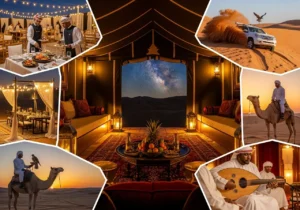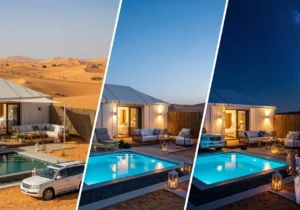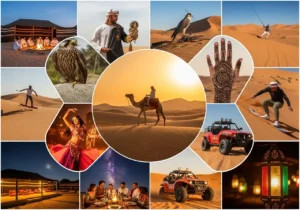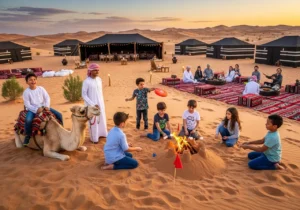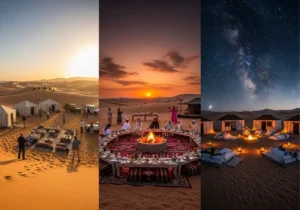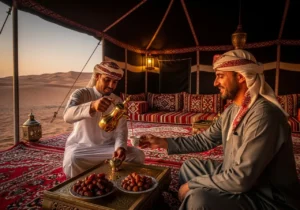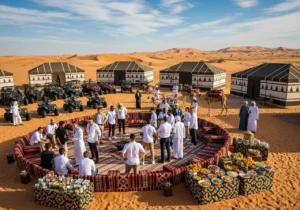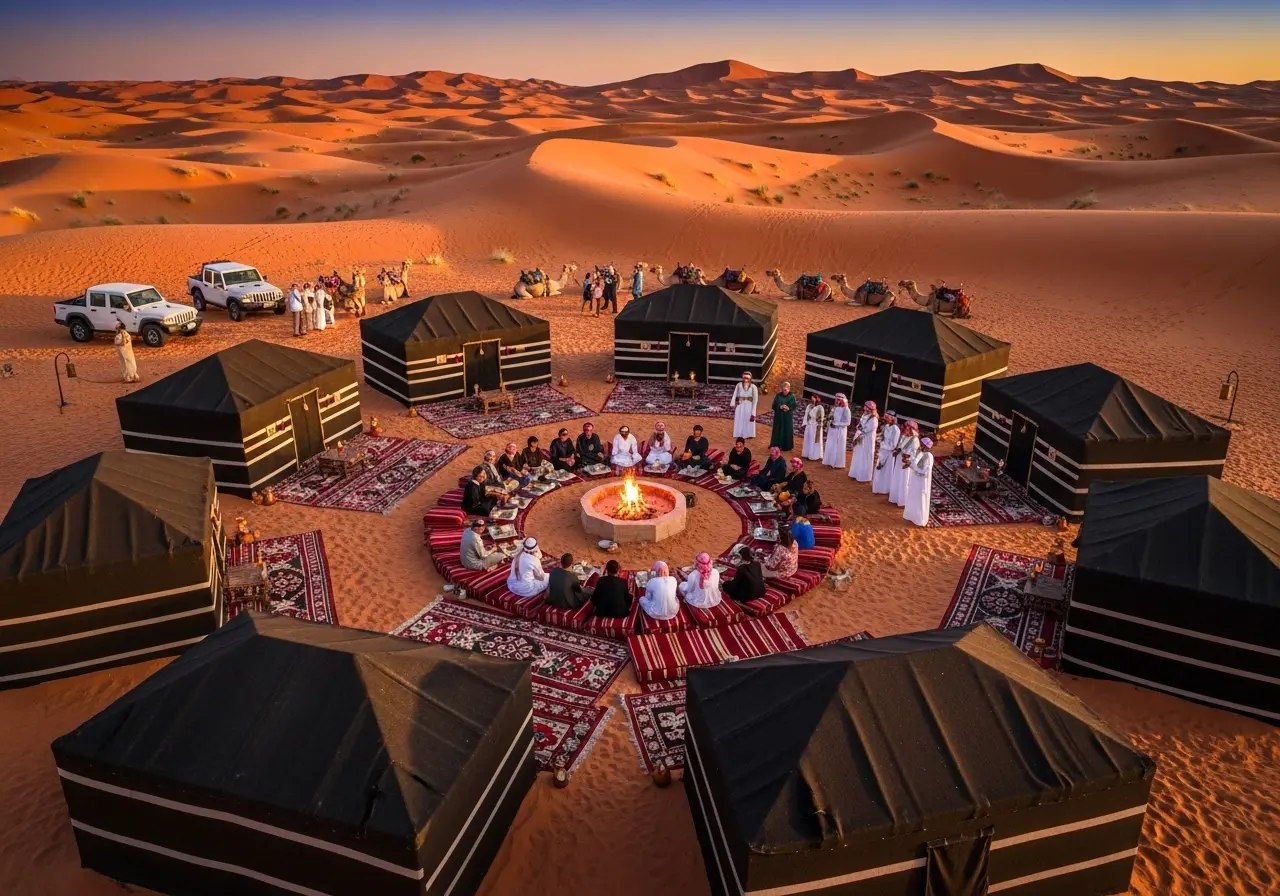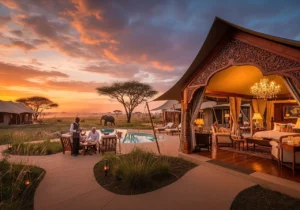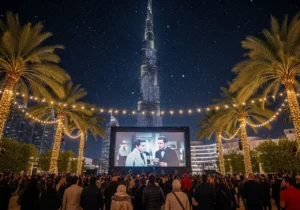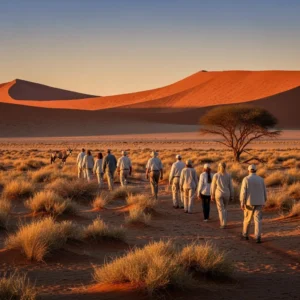A Living Heritage: How Desert Safari Camps Promote Culture and Tourism
In the dazzling, futuristic landscape of Dubai, where the world looks to witness the future, there is a powerful and enchanting experience that draws visitors back into the past. The desert safari is more than just an adventure; it is a vital and dynamic stage upon which the rich tapestry of Emirati heritage is showcased. This is the ultimate guide to how Desert Safari Camps Promote Culture and play a crucial role in the emirate’s vibrant tourism ecosystem.
This in-depth exploration will take you on a journey beyond the thrilling activities and into the very soul of the desert safari: the traditional Bedouin-style camp. We will discover how these camps are not just entertainment venues, but are living museums and cultural hubs. This guide will show how Desert Safari Camps Promote Culture in a way that is both engaging and deeply meaningful.
We will delve into how every aspect of the camp experience, from the warm welcome with coffee and dates to the mesmerizing entertainment and the delicious food, is a carefully preserved and beautifully presented piece of a rich cultural puzzle. We will explore how these experiences create a powerful bridge between tourists and the authentic heritage of the UAE.
Prepare to see the desert safari in a new light. This is a story of preservation, celebration, and the incredible synergy between tourism and tradition, a story that proves that Desert Safari Camps Promote Culture in the most beautiful and unforgettable way.
The Camp as a Living Museum: Preserving Tangible Heritage
One of the most immediate ways Desert Safari Camps Promote Culture is by acting as living, interactive museums. They recreate the tangible, physical world of the traditional Bedouin way of life, offering visitors a glimpse into a bygone era.
Recreating Traditional Architecture
The very design of the desert camp is a lesson in heritage.
- The
Beit Al-Sha'ar(House of Hair): While modern camps are more permanent structures, their design is inspired by the traditional Bedouin tents. These tents were woven from goat hair, an ingenious material that would shrink when wet to become waterproof and expand in the heat to be more breathable. - The
MajlisSeating: The central seating area, with its low tables, plush carpets, and comfortable cushions on the ground, is a recreation of the traditionalmajlis. This was the social heart of the Bedouin home, a place for gathering, conversation, and hospitality. - Natural Materials: The camps are often constructed using materials that evoke the traditional building methods, such as palm fronds (
arish), wood, and heavy textiles.
By immersing guests in this traditional architectural style, the camps provide a tangible connection to the past, a key way that Desert Safari Camps Promote Culture.
Showcasing Traditional Artifacts
The camps are often decorated with authentic or replica artifacts that were essential to the Bedouin way of life. This turns the entire camp into an interactive exhibit.
- The
DallahandFinjan: You will see the iconic Arabic coffee pots and the small, handleless cups displayed prominently. - Falconry Equipment: You might see the traditional
mankalah(the falconer’s glove) and theburqa(the falcon’s hood). - Old Tools and Weapons: Some camps display traditional tools, historical photographs, and ornate daggers (
khanjars).
The Soul of the Safari: Preserving Intangible Heritage
Beyond the physical objects, the most powerful way Desert Safari Camps Promote Culture is by preserving and showcasing the UAE’s “intangible heritage”—the living traditions, skills, and art forms that are passed down through generations.
The Art of Hospitality: The Gahwa and Dates Ceremony
The welcome ritual of serving Arabic coffee and dates is the first and most profound cultural immersion for any guest.
- A Living Ritual: This is not a reenactment; it is the genuine and living practice of Emirati hospitality.
- An Educational Moment: The host’s explanation of the etiquette—of receiving the cup with the right hand and shaking it to decline a refill—is a direct and memorable cultural lesson.
This simple, beautiful act instantly communicates the core Emirati values of generosity and respect, a key reason Desert Safari Camps Promote Culture so effectively.
Culinary Heritage: A Taste of Arabia
The barbecue dinner is far more than just a meal; it is an accessible and delicious introduction to the flavors of the region.
- Showcasing Local Cuisine: The buffet allows thousands of tourists each night to sample authentic Emirati and Middle Eastern dishes they might not otherwise try, from
hummusandmutabaltomachboosandluqaimat. - The Stories Behind the Dishes: Good safari guides will often explain the significance of certain dishes, connecting the food to the culture and the history of the region.
The Performing Arts: A Stage in the Sands
The live entertainment is one of the most vibrant and memorable ways that Desert Safari Camps Promote Culture.
- The Tanoura Dance: While its roots are in Egypt and Sufism, the Tanoura has become a beloved part of the regional entertainment tapestry. The performance is a dazzling display of folkloric art, showcasing incredible skill and physical endurance.
- Belly Dancing: This performance showcases a vibrant and celebrated art form from across the Middle East, bringing energy and a sense of celebration to the evening.
- The Fire Show: While a more modern addition, the fire show connects to the primal, universal element of the campfire and is a thrilling spectacle that transcends language barriers.
Traditional Crafts and Skills
The camps provide a vital platform for traditional crafts and skills to be seen and appreciated by a global audience.
- Henna Painting: The henna station is a fantastic, interactive cultural exchange. It allows guests to experience the beauty of this ancient art of adornment firsthand. It also provides employment for talented female henna artists, helping to keep the tradition alive.
- Falconry: The falconry display is a powerful educational tool. It showcases a tradition that is a UNESCO Intangible Cultural Heritage of Humanity and is deeply woven into the soul of the Emirates. This demonstration is a highlight of how Desert Safari Camps Promote Culture.
The Economic Engine: How Desert Safari Camps Boost Tourism
The Desert Safari Camps Promote Culture, and in doing so, they also provide a massive boost to Dubai’s tourism economy. The two are inextricably linked.
A Gateway Experience for Tourists
For millions of tourists every year, the desert safari is their primary, and sometimes only, deep immersion into the traditional culture of the UAE. It is often listed as the number one “must-do” activity in Dubai.
This single, all-inclusive package provides an incredibly accessible and entertaining entry point into the local heritage. It takes the culture out of the museum and brings it to life in a dynamic and unforgettable way. This makes it a powerful driver for the entire tourism industry.
Supporting Local Artisans and Performers
The desert safari industry is a major source of employment for a wide range of local and regional talent.
- Safari Guides: It employs a large number of professional, licensed safari guides who are ambassadors for their culture.
- Artisans: It provides a platform and a source of income for henna artists, calligraphers, and the craftspeople who create the souvenirs sold at the camps.
- Performers: It is one of the largest employers of traditional Tanoura dancers, belly dancers, fire performers, and musicians in the region.
This support for local talent is a crucial way that Desert Safari Camps Promote Culture and contribute to the local economy.
Driving the Rural Economy
The safari operations are, by their nature, located outside the main city. This means they bring economic activity to more rural areas, supporting businesses like camel farms and local suppliers.
Diversifying Dubai’s Tourism Offering
The desert safari is a vital part of Dubai’s tourism portfolio. It provides a perfect and essential contrast to the city’s other main attractions, such as the malls, beaches, and modern landmarks.
It allows Dubai to offer a complete and well-rounded destination experience, catering to travelers who are seeking not just luxury and entertainment, but also authentic cultural adventures. This diversification is a key reason Desert Safari Camps Promote Culture and are so important to the city’s global appeal.
The Modern Evolution: Education and Sustainability
The Evolution of Desert Safari Camps continues, and the modern trend is towards an even greater focus on education and sustainability.
From Entertainment to “Edutainment”
There is a growing emphasis on the educational aspect of the safari. The role of the safari guide is evolving from just being an expert driver to being a knowledgeable “storyteller” and cultural ambassador.
The best guides today provide a running commentary on the desert’s ecosystem, its flora and fauna, the history of the Bedouin people, and the meaning behind the cultural traditions at the camp. This “edutainment” approach makes the experience even more enriching for visitors.
The Rise of Eco-Tourism and Sustainable Culture
The latest and most important evolution is the move towards eco-friendly and sustainable safaris.
- A Culture of Respect: These tours promote a culture of deep respect for the desert environment. They often operate in protected areas like the Dubai Desert Conservation Reserve (DDCR).
- Preserving the Natural Heritage: By practicing responsible wildlife viewing, eliminating single-use plastics, and using solar power, these camps are preserving the natural heritage that is the very foundation of the Bedouin culture they celebrate.
This commitment to sustainability is a modern expression of the traditional Bedouin value of living in harmony with the desert. This is the future of how Desert Safari Camps Promote Culture.
Integrating The Cultural Experience with a Full Adventure
The way that Desert Safari Camps Promote Culture is by offering a complete, immersive package. The cultural elements are perfectly integrated with the adventure of the safari itself.
To ensure you are booking a high-quality, safe, and authentic adventure that truly celebrates the local heritage, it is wise to choose a reputable tour operator. For a truly premium experience that focuses on delivering an exceptional and authentic cultural immersion, a company like https://royaldesertadventures.ae/ offers a range of top-tier safari packages that are designed to create lasting memories.
When planning your complete Dubai vacation, it can be very helpful to work with experienced local tour companies. Reputable providers such as https://dubaidesertsafarie.com/ offer a comprehensive range of city tours and desert adventures. For planning diverse excursions and activities across the UAE, https://hafiztourism.com/ is another excellent and trusted partner that can help you craft your perfect trip.
Frequently Asked Questions (FAQs)
- How authentic is the cultural experience at a desert safari camp? While the camp is a modern tourism creation, the cultural elements it showcases are highly authentic. The rituals of hospitality like serving Arabic coffee and dates, the art of henna painting, the traditional music, and the folkloric Tanoura dance are all genuine and respected parts of the region’s heritage. The camp provides a fantastic and accessible “stage” for these traditions, which is how Desert Safari Camps Promote Culture.
- Is the desert safari the best way to experience local Emirati culture? It is one of the best and most entertaining ways. While visiting museums and heritage sites is also essential, the desert safari is unique because it is a living, interactive experience. It allows you to taste the food, see the performances, and participate in the activities, which is a very powerful way to connect with a culture.
- Do the safari guides really teach you about the culture? Yes, on a tour with a reputable operator, the safari guides are a key part of the cultural experience. They are highly knowledgeable and are trained to be cultural ambassadors. They will share fascinating insights into the Bedouin way of life, the desert ecosystem, and the meaning behind the traditions you are experiencing.
- How does the safari support local artists and performers? The desert safari industry is a major source of employment and a vital platform for local and regional artists. It provides a consistent and well-paying stage for professional Tanoura dancers, belly dancers, fire performers, and traditional musicians to practice and showcase their craft to a global audience. This is a crucial way Desert Safari Camps Promote Culture.
- Is the food served at the camp authentic Emirati cuisine? The dinner buffet is typically a blend of authentic Emirati and broader Middle Eastern dishes, along with some international options to cater to all tastes. You will find many authentic items like
hummus,mutabal, and grilled kebabs. Some premium camps also offer specific Emirati main dishes likemachboosorsalona. - What is the most important cultural tradition I will experience at the camp? The most important and profound tradition is the ritual of hospitality, which begins with the serving of Arabic coffee and dates. This single act encapsulates the core Emirati values of generosity, respect, and welcoming, and it sets the tone for the entire cultural experience of the evening.
- How does the Tanoura dance promote culture? The Tanoura dance is a beautiful form of folkloric art with deep spiritual roots in the region. By showcasing this mesmerizing performance, the camps are preserving a traditional art form and introducing it to a new, global audience that might otherwise never have the chance to see it, which is a powerful way Desert Safari Camps Promote Culture.
- Is the falconry display culturally significant? Yes, falconry is one of the most important and revered traditions in the UAE and is a UNESCO Intangible Cultural Heritage of Humanity. The falconry display at the camp is a tribute to this ancient Bedouin skill and a celebration of the deep bond between the falconer and their bird.
- How does visiting a desert safari contribute to Dubai’s tourism goals? The desert safari is a cornerstone of Dubai’s tourism strategy. It diversifies the city’s offerings beyond its modern attractions, provides a unique and highly-rated “must-do” experience, and showcases the authentic heritage and culture of the Emirates, which is a key goal for the tourism board.
- Does a luxury safari offer a more authentic cultural experience than a budget one? Often, yes. While all safaris offer a taste of the culture, the luxury and premium operators often focus on providing a more in-depth and authentic experience. This can include operating in a protected conservation reserve, offering heritage wildlife drives in vintage vehicles, and having more knowledgeable guides who spend more time explaining the cultural nuances.
- What is the
majlisand how does it relate to Emirati culture? Themajlisis the traditional Arabic seating area, and it is the social heart of any gathering. It is a place for conversation, for sharing coffee, and for strengthening community bonds. The seating arrangement at the desert camps is based on this important cultural concept, promoting a relaxed and social atmosphere. - How does henna painting support local culture? The henna station at the camp provides a platform for talented female henna artists to practice their traditional craft and earn an income from it. It keeps the art form alive and visible, and it allows for a wonderful, personal interaction between the artist and the guest, which is a beautiful way Desert Safari Camps Promote Culture.
- Is the entertainment program modified during Ramadan? Yes, out of respect for the holy month of Ramadan, the entertainment program is modified. The belly dancing performance is paused. The focus shifts to more traditional and folkloric music and performances, offering a different but equally authentic cultural experience.
- How do the new eco-friendly camps promote a “culture of conservation”? The rise of eco-friendly camps is a modern evolution that promotes a culture of respect for the desert environment, which is a core traditional Bedouin value. By using solar power, eliminating plastics, and focusing on responsible wildlife viewing, these camps are teaching visitors the importance of preserving the natural heritage that is the foundation of Emirati culture.
- What is the best way to choose a safari that truly focuses on culture? Look for operators that specifically advertise a “heritage” or “cultural” safari. Read their itineraries carefully to see if they include activities like a wildlife drive in a conservation reserve, a visit with a local Bedouin family, or more in-depth cultural demonstrations. Reading recent reviews is also essential to ensure the company delivers on its promise.
A Bridge Between Worlds
The Desert Safari Camps Promote Culture by acting as a powerful and entertaining bridge between the modern, international world of Dubai’s visitors and the rich, ancient heritage of the Emirati people. They are not static museums but dynamic, living stages where the traditions of the desert are celebrated, preserved, and shared every single night.
They are a vital part of Dubai’s tourism landscape, offering an experience that is both thrilling and deeply meaningful. By immersing guests in the warmth of Bedouin hospitality, the beauty of traditional arts, and the flavors of local cuisine, these camps do more than just entertain; they foster a genuine sense of connection and a lasting appreciation for the timeless soul of Arabia.
